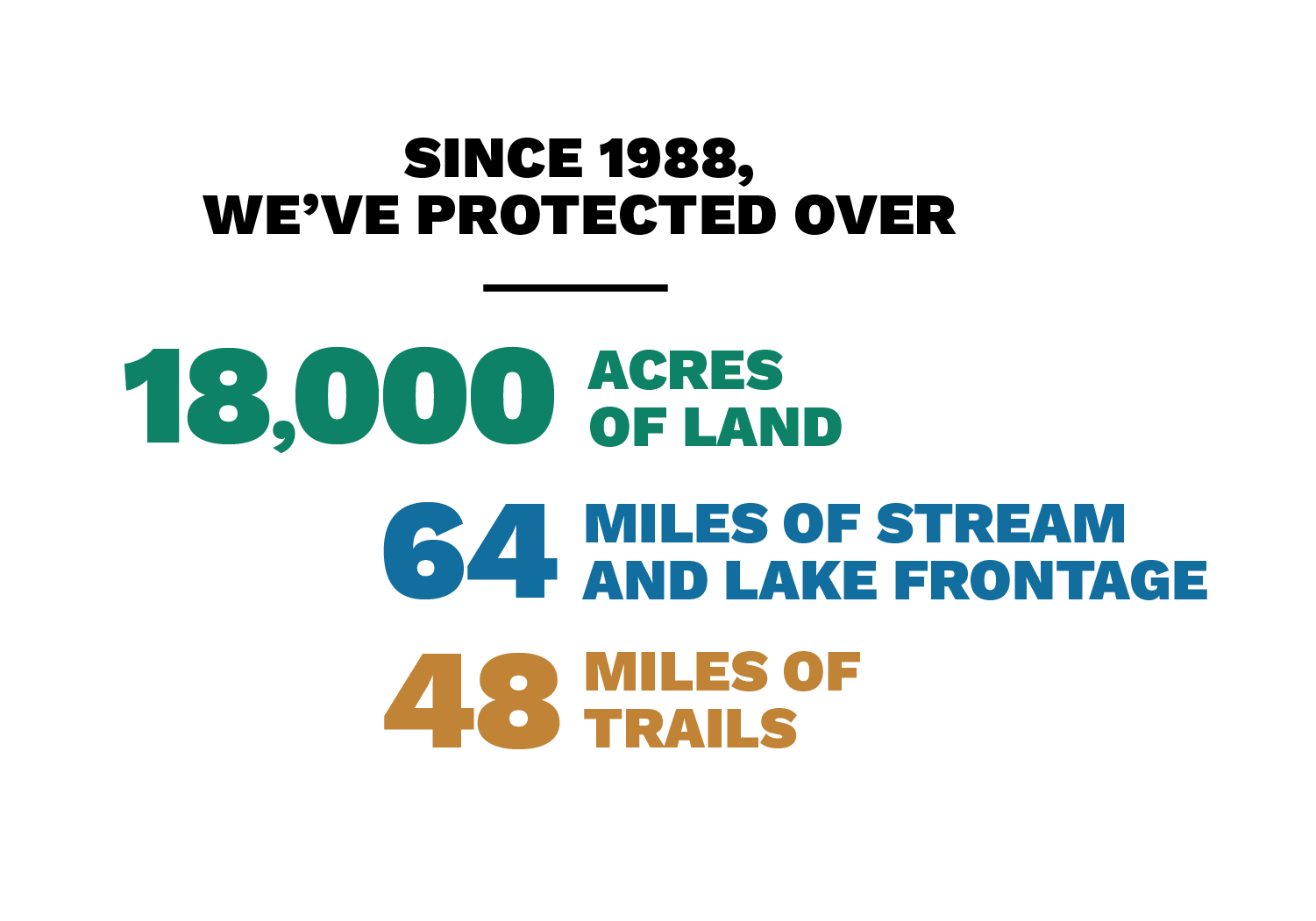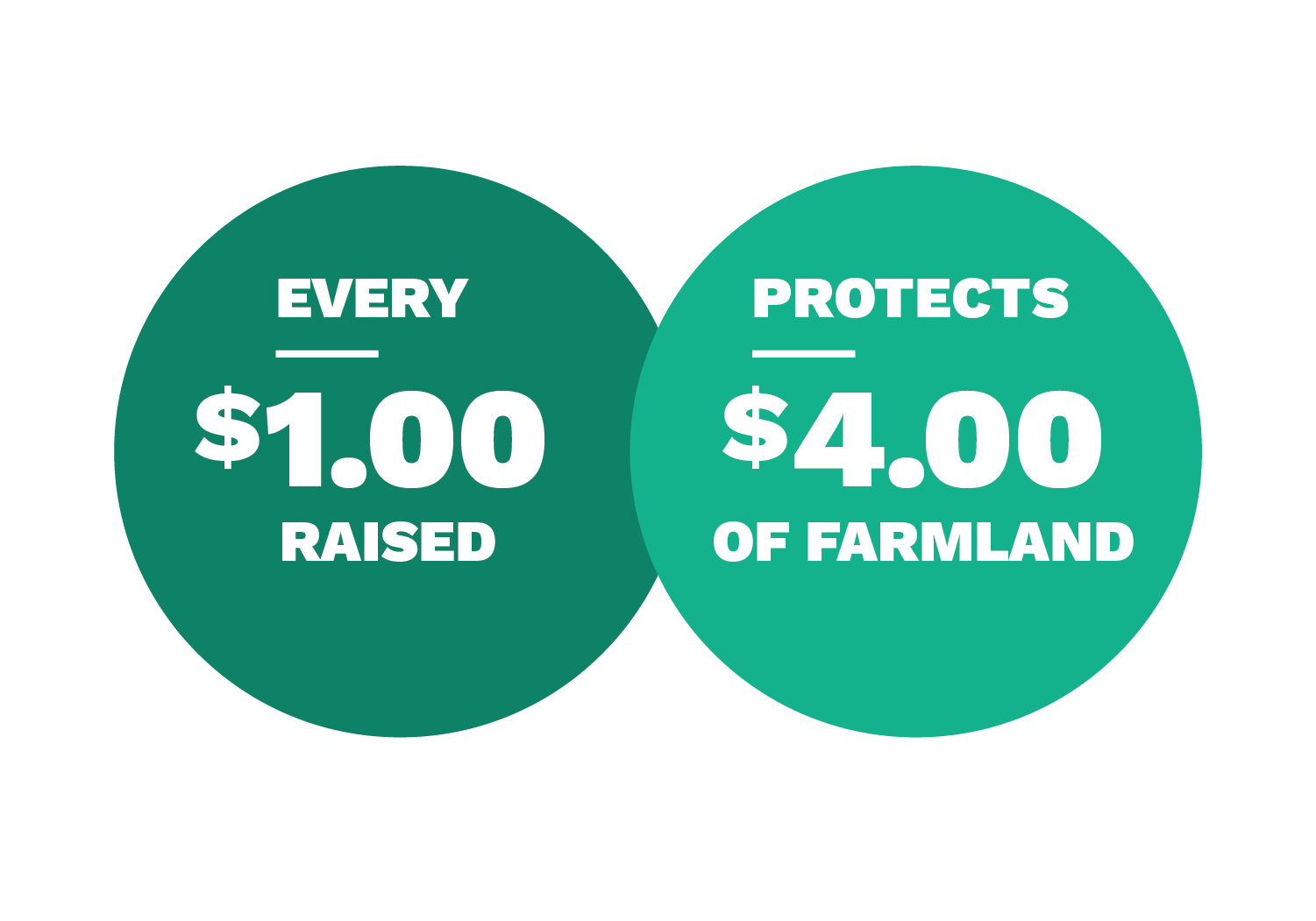Three Farms, 380 Acres Forever Protected in East Leland, M-204 Suttons Bay Area
From our 2008 Spring Newsletter
For everyone who loves sweet, local strawberries and honey crisp apples, take heart in knowing that two of the farms that are major producers of the fruit have been forever protected. The Leelanau Conservancy signed agreements in December that will protect 380 acres and three farms. All of the land is within a six-mile radius; one farm has frontage along M-204 near Suttons Bay and the other two are in nearby East Leland.
“It’s been a long arduous road, but it’s truly been an honor working with these growers who are absolutely committed to doing their part to ensure that our agricultural heritage lives on in Leelanau,” says the Conservancy’s farmland protection specialist Tom Nelson. “Two of these farm projects have been in the works for nearly four years, and the other one came to us just this year. Together these farms tell the story of what is happening in Leelanau County farming today and also are a great start toward protecting the rich agricultural heritage in the M-204, East Leland area.”
The largest of the three farms—and one of the oldest in the county–is owned by Gary and Christi Bardenhagen. The 184-acre property produces the much-celebrated local strawberries that are sold at area markets such as Hansen’s and the Leland Mercantile. They also grow cherries and blackberries.
Christi’s great-grandfather, Johann Bremer, homesteaded the land in 1865. The Bardenhagen’s son Steve, 38, who will take over the farm soon, is the fifth generation to work this hilly, beautiful land on Horn Road.
“I’m excited,” says Steve. “It’s a great opportunity and what I want to do—to farm, and to make sure that the land is preserved for future generations to farm it as well.” Steve and his parents say they could not have made the generational transfer of land without the help of the Leelanau Conservancy and receiving compensation in exchange for agreeing not to develop the land. Basically, under such agreements known as “purchase of development rights,” farmers are paid the difference between what their land is worth for agricultural use versus what it is worth if it were subdivided and turned into residential development. Purchase prices paid for the development rights, representing 75 percent of appraised value in each case, were $3283 per acre for the Gary and Christi Bardenhagen farm and $2,900 per acre for the Jim and Jan Bardenhagen farm.
“It’s a win-win,” says Gary. “We get income for our retirement and can now sell the land to Steve at a price per acre that he can afford and that we think will cash flow for him.” And the rest of us get to enjoy the wonderful fruit—and the scenic views–this farm produces.
Funding for the Gary and Christi Bardenhagen farm project came in part from state and federal farmland protection funds obtained through the Leelanau Conservancy. Conservancy private donors, along with $27,464 in donations that had been directed to the now defunct Leelanau County Farmland Protection Program, made up the difference.
The going price per acre for farmland in the county now (about $6,000) is a far cry from the days when Christi’s great grandfather, Johann Bremer, made the first generational transfer of the entire 184 acres for a mere $1,500 to his son, John. Bremer was a German immigrant who served in the Civil War. He homesteaded the land soon after, and built the old weathered barn and nearby farmhouse that Steve now lives in. One of the treasured artifacts of the farm is a framed contract of that first $1,500 sale from Johann to his son, John. Along with the money, Johann required annually three bushels of flour, 10 cords of wood, and fruit from 15 trees—to be selected by him. Johann also bound his son to care for his medical needs and keep his clothing in good repair until his death.
The land then passed to Christi’s father, Edwin. It was her father’s dream, says Christi, that the land would always stay in farming. But it wasn’t until she had a family of her own that she considered taking over the operation.
“Both Gary and I were raised on farms, and after graduating high school from Leland, we wanted out,” she says. Gary earned a degree from MSU and went to work for IBM in New York state. But, when faced with their third company move in five years time, and young children to consider, Christi says the couple’s priorities shifted. “We wanted to stay in one spot,” she said. Leelanau County seemed like the right place. “At the same time, my dad was getting ready to retire, and offered to sell us the farm.”
None of her four siblings were interested, but Christi and Gary were. They wanted to come home and discovered that the price her father had asked for the 184-acre farm was the same as buying a small piece of land and building a house. They signed a 20-year land contract and the farm was theirs. That was 1973. Gary took a job with a firm in Traverse City and they moved in to the old farmhouse. “We thought we would be able to run the farm on weekends, and in our free time,” she laughs. “We were so wrong.” After about a year, Gary had to give up his day job.
Steve has followed a similar path. After earning an electrical engineering degree from MSU, he also left the area. But like his parents, Steve returned, drawn by the pull of the land. “He started helping us and gradually he’s realized that he wants to be here. He hasn’t looked back,” says Christi. Steve’s two children Nick (17) and Megan (11) are the sixth generation descended from Johann Bremer to work on the farm.
“My dad would be so pleased,” says Christi. “He felt strongly about keeping the land in farming and was very committed to it. He influenced our path.”
The second farm protected via the sale of development rights also bears the name of Bardenhagen. Jim Bardenhagen, along with his wife Jan, owns and runs an 80-acre farm on Pertner Road where he and Gary grew up. Their two operations are just a few miles apart, which allows them to share equipment and work crews—and to carry on the long-established tradition of family helping family during peak harvest times.
Like Gary and Christi’s farm, Jim and Jan’s place also has a rich history. The brothers’ great-great grandfather homesteaded the land about 125 years ago and his great uncle built the farmhouse. With its wide-plank floors and massive kitchen table, the house is a favorite gathering place for extended family.
Jim’s path to farming parallels Gary’s. He, too, left the state after graduating from MSU with a degree in marketing and transportation. But 12 years later he came back to help his dad on the farm. Over the next several years he juggled farming and his job as extension director for MSU. During this same time, the family sold off 90 of its 170 acres—a move Jim regrets. Even though the land he sold is still in farming, he says he is now looking for more acreage to grow more unique crops.
Jim’s 36-year-old son, Chris, also wants to carry on the family farming tradition. He and his young family live just up the road, and as a licensed mechanic, Chris services the farm machinery on the farm. He also helps to grow and harvest the sweet, tart and Balaton cherries, honey crisp apples, table grapes, currents, new potatoes, and just recently, organic free-range poultry. Jim says that Chris is challenging him to move in new directions. Chris is shifting more toward the growing and profitable organic market.
“I enjoy the science of sustainable agriculture and that’s what’s making me excited about being in farming right now, instead of doing the same old thing,” says Chris. “Leelanau is a great area to live in and I like being outdoors working with the land and the equipment. It would have been much more difficult to do it without the help of the Leelanau Conservancy. What the Conservancy is doing in general is really great, but the development rights program in particular will help me take over the farm in a reasonable way and make a decent living.”
The other 120-acre farm is currently known as the Spinniken farm on off M-204. It was purchased by Roger Newton and his family, who live in Ann Arbor and hope to one day grow grapes on the land. In the meantime, the Newtons are working with the Spinniken family to keep the current orchards in production, and gradually transition a portion of the land to grapes.
The Newtons have placed a “conservation easement” on the land, which restricts the 120 acres to just two home sites. In return for their donated easement, which significantly lowers the value of the property, the Newtons will receive tax benefits.
But the tax breaks, says Newton, a longtime Conservancy supporter, are not the motivation behind purchasing this land. “There are lots of other ways to get tax breaks,” he says. “This property has been farmed for well over 100 years. We’d like to see the land used for what it was meant to be used for…and that’s farming.”
“My wife and I took a drive around different parts of the county last summer,” adds Newton. “We couldn’t believe how many large tracts of farmland were for sale. It shocked us and made us sad.” Because of the land’s close proximity to the new courthouse, Newton says he thought it was particularly vulnerable to development.
But instead, Newton envisions that one day the hillsides will be covered in grapes, not houses. Because of its topography, the land is particularly suited to those red grape varieties that need a longer period of time to ripen, and could also be ideal for grapes used in making “ice wine.” Newton says he views grape growing as one of the long-term solutions to preserving farmland, because of the increasing demand for grapes.
The Newton family has also preserved another 90-acre farm along Jelinek Road and work with the prior owner there as well to keep the land in agriculture. “We love Leelanau County,” says Newton, “and we feel best there than any other place in the world. It gives us some sense of relief to have protected over 200 acres of farmland in two different townships.
“Collectively, we have our work cut out for us if farming in Leelanau is to survive,” says the Conservancy’s Tom Nelson. “Thankfully, in the last year we have seen more and more good people and good organizations turning their attention toward promoting a sustainable agricultural economy in the region, and these growers are no small part of that equation. They represent a seed that has been planted, and with a lot of hard work, will bear fruit in helping to keep farming alive and retaining our great farm families as an integral part of the fabric of that is Leelanau County.”
Published in 2007



